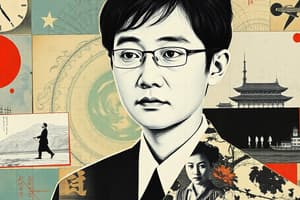Podcast
Questions and Answers
How did cultural exchange primarily influence the development of Korean literature?
How did cultural exchange primarily influence the development of Korean literature?
- By adopting and then transliterating Chinese poetry, leading to the creation of Hangul. (correct)
- Adopting the Arabic literary tradition which led to new wave of Korean Literature.
- By emulating European literary styles after the 15th century, fostering a sense of nationalism.
- Through the direct translation of Sanskrit texts into Korean, enriching its philosophical depth.
In what way did British colonization affect the trajectory of Indian literature?
In what way did British colonization affect the trajectory of Indian literature?
- It fostered a revival of ancient Hindu writings, reinforcing traditional cultural values.
- It introduced English literature as a major influence, overshadowing the traditional literary forms. (correct)
- It led to the suppression of oral traditions and the exclusive promotion of Sanskrit literature.
- Helped translate the Vedas, Brahmanas, and the Upanishads into English
How did political changes in Central Asia influence its literature?
How did political changes in Central Asia influence its literature?
- By reflecting the impact of tsarist and Soviet regimes, leading to politically charged cultural expressions. (correct)
- By fostering a deep connection to nature and the nomadic lifestyle.
- By introducing a new theme of love.
- By promoting themes of religious devotion and spiritual exploration.
What role did Islam play in the development of Arabic literature, and how did this literature affect other cultures?
What role did Islam play in the development of Arabic literature, and how did this literature affect other cultures?
How have Buddhist, Thai, and English cultures shaped Burmese literature?
How have Buddhist, Thai, and English cultures shaped Burmese literature?
What impact did the Korean War have on South Korean literature?
What impact did the Korean War have on South Korean literature?
How did the end of colonial rule in India affect its literary landscape?
How did the end of colonial rule in India affect its literary landscape?
How did the Soviet Union impact the literature of Central Asia?
How did the Soviet Union impact the literature of Central Asia?
What is a major challenge faced by Arabic writers in the 21st century?
What is a major challenge faced by Arabic writers in the 21st century?
What was a key theme in Burmese works of the 20th century, and what influenced it?
What was a key theme in Burmese works of the 20th century, and what influenced it?
What role did newspapers play in the 1800s related to African writers?
What role did newspapers play in the 1800s related to African writers?
What significant movement influenced poetry in the 1930s, featuring French-speaking poets such as Léopold Senghor?
What significant movement influenced poetry in the 1930s, featuring French-speaking poets such as Léopold Senghor?
What broader theme is reflected in V.Y. Mudimbe's Before the Birth of the Moon (1989)?
What broader theme is reflected in V.Y. Mudimbe's Before the Birth of the Moon (1989)?
What did oral literature in Africa primarily serve to do?
What did oral literature in Africa primarily serve to do?
How did the slave trade influence African literature?
How did the slave trade influence African literature?
What is the origin of written Indian literature?
What is the origin of written Indian literature?
In what language was the Veda written?
In what language was the Veda written?
When did Western literature's influence on Thailand become most pronounced?
When did Western literature's influence on Thailand become most pronounced?
Why was Ngugi wa Thiong'o imprisoned?
Why was Ngugi wa Thiong'o imprisoned?
Flashcards
Hangul
Hangul
Korea's distinct writing system developed in the 15th century.
The Veda
The Veda
Ancient Hindu writings that form the roots of Indian literature and are written in Sanskrit.
Arabic literary tradition
Arabic literary tradition
Flourished in the Middle East and influenced Persian, Byzantine, and Andalusian traditions.
Mo Yan
Mo Yan
Signup and view all the flashcards
Korean War: Literature
Korean War: Literature
Signup and view all the flashcards
African oral tradition
African oral tradition
Signup and view all the flashcards
Gustavus Vassa, the African
Gustavus Vassa, the African
Signup and view all the flashcards
Ngugi wa Thiong'o
Ngugi wa Thiong'o
Signup and view all the flashcards
Griots
Griots
Signup and view all the flashcards
Négritude Movement
Négritude Movement
Signup and view all the flashcards
Study Notes
- East Asia is home to the Korean literary tradition.
- China's cultural dominance in East Asia became evident with Korean poets writing poetry in Classical Chinese as early as the 4th century CE.
- By the 7th century, transliterations of classical Chinese works were seen.
- Hangul, the distinct Korean writing system, was developed in the 15th century, leading to a new wave of Korean literature.
- South Asia recognizes India as a significant cultural center.
- The roots of Indian literature can be traced to Hindu writings like the Vedas, Brahmanas, and Upanishads.
- The Vedas were written in Sanskrit, giving rise to literary works around 1500 BCE.
- Written Indian literature emerged relatively late, around the 16th century, despite the existence of an ancient oral tradition.
- British colonization brought English literature as a major influence.
- Central Asia has a diverse literary landscape.
- The region includes Afghanistan, Kazakhstan, Turkmenistan, Uzbekistan, Mongolia, Tibet, and Nepal.
- Central Asian literature was political, shaped by tsarist and Soviet regimes.
- The Arabic literary tradition thrived in the Middle East.
- Islam was a fundamental aspect of the culture and Arabic literature influenced Persian, Byzantine, and Andalusian traditions.
- European civilizations emulated Arabic literature in the Middle Ages.
- Southeast Asian literature is briefly surveyed.
- Literature in Burma has been influenced by Buddhist, Thai, and English cultures.
- Thailand had two golden eras of literature: during the reign of King Narai (1657-1688) and King Rama II (1809-1824).
- Malaysia and Indonesia's literary traditions owe much to Sanskrit and Islamic culture.
Contemporary Times: A Snapshot
- Chinese writers have remained prolific in modern times.
- Mo Yan, a fictionist, won the 2012 Nobel Prize for Literature.
- Other remarkable figures include Yu Hua, Wang Shuo, Shi Tiesheng, Gao Xiaosheng, Wang Zengqi, and Zhang Chenzhi.
- Western influences have permeated Japanese literature since the Meiji Restoration in the 19th century.
- Modern Japanese novels, translations of Western poetry, and reinventions of traditional forms like tanka and haiku emerged.
- Playwrights like Abe Kobo and Mishima Yukio became known for their world-renowned dramas.
- The Korean War significantly impacted Korean literature, leading to the creation of North and South Korea.
- Themes of alienation, conscience, and disintegration have appeared in Korean literature since the 1950s.
- Self-identity has become a strong theme in Korean poems, novels, and plays into the 20th century.
- India gained independence in the 20th century, but the impact of colonial rule continued through the endurance of the English language.
- Several Indian writers gained international acclaim, including Rabindranath Tagore, Prem Chand, Raja Rao, and R.K. Narayan.
- Russian influence continued to have a stronghold on literature from Central Asia.
- During the Soviet era, Abdullah Qadiriy produced pioneering novels in Uzbek.
- Mukhtar Auez-uli became a noteworthy writer in Kazakh, and Chingiz Aytmatov gained recognition as a successful writer in Russian in the 20th century.
Arabic Tradition
- Freedom of expression has become a problematic issue for Arabic writers in the 21st century, as has the tension between religious and secular movements.
Southeast Asia
- Colonial and postcolonial experiences were clear in Burmese works in the 20th century.
- In Thailand, Western literature became influential after contact with the West during World War II.
- Writers in Malaysia and Indonesia developed distinct voices when the new Malay and Indonesian languages were born.
African Literature
- African literature resonates with the human spirit.
- Africa has a captivating oral tradition and written literature shaped by colonial and postcolonial experiences.
- African literature has linguistic flavors from local languages and colonizers' tongues.
- Oral literature documented exploits, reminded about traditions, and entertained while educating.
- Genres included myths, stories, riddles, proverbs, and dramas.
- Praise singers called griots enhanced narratives with music.
- Oral tradition flourished until the 15th century due to interactions with Europe and Asia.
- The slave trade in the 1400s shaped the collective African psyche, compounded by European colonization in the 19th century.
- Colonization's psychological and social impact manifested in literature.
Literary Works
- "The Interesting Narrative of the Life and Adventures of Olaudah Equiano or Gustavus Vassa, the African" (1789) depicted a slave's suffering.
- Poetry was also used to convey the horrors of slavery, as exemplified by George Moses Horton's "On Liberty and Slavery."
- Resistance movements in the 19th century led to literary works expressing the desire for freedom.
- Newspapers were used for bold African writers.
- The negritude movement became prominent in the 1930s.
- Léopold Senghor, Aimé Césaire, and Léon Damas were French-speaking poets of the movement.
- Narratives like Thomas Mofolo's "Chaka" drew inspiration from local figures to express reactions against colonial repression.
- After World War II, the cry for independence intensified, with African writers embodying the spirit of nationalism.
- Significant writers included Chinua Achebe, Wole Soyinka, Kofi Awoonor, Ngugi wa Thiong'o, Okot p'Bitek, Dennis Crutus, Es'kia Mphahlele, Nadine Gordimer, and Jacques Rabémananjara.
Contemporary Times
- African writers chronicle new challenges in their societies after colonialism.
- New governments may have been installed, but their problems caused writers to react.
- Ngugi wa Thiong'o was imprisoned for a play considered subversive.
- Corruption in society, a theme in postcolonial times, was reflected in V.Y. Mudimbe's "Before the Birth of the Moon" (1989).
- Must-reads include "The Cardinals" by Bessie Head.
Studying That Suits You
Use AI to generate personalized quizzes and flashcards to suit your learning preferences.




